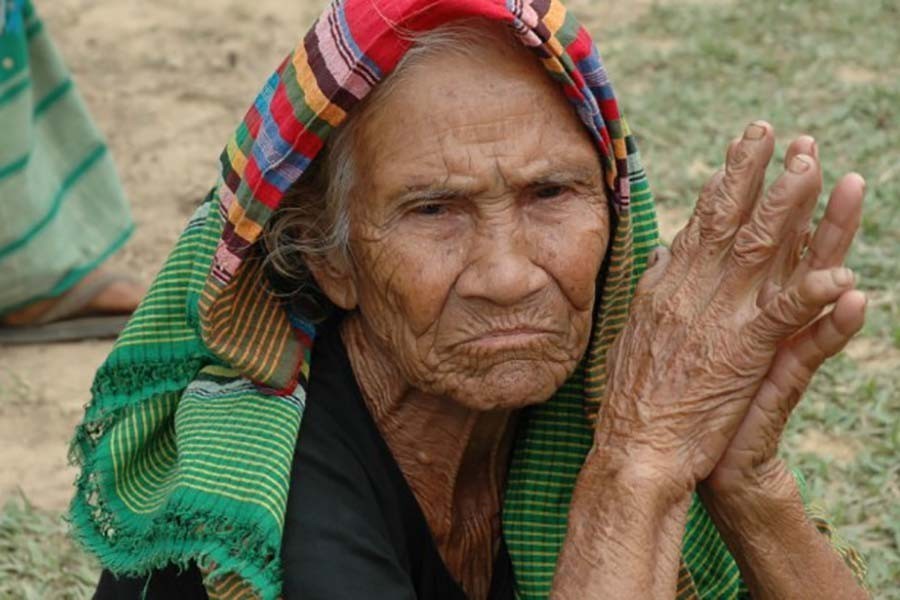The news was that on February 2, film actor Riaz's father-in-law committed suicide by shooting in the head with his licensed pistol. This is how Abu Mohsin Khan, 58 years old, just two years shy of becoming a senior citizen, was overshadowed by his flimsiest connection with the tinsel town. His very identity as a person who had earlier pursued a business career did not count much to the media.
On the fateful day, the man even attended the namaj-e janaza (last rite) of a relative at Mohammadpur. He returned to his Dhanmondi residence where he lived alone in the afternoon and at 9:15 ended his life. What prompted him to take his own life is indeed a troubling question. He may not be a senior citizen and have not belonged to the country's most suicide-prone group which is below 40 years of age, but perhaps the pandemic has made it incumbent that health scientists and psychologists revisited the psychic state of the senior citizens.
The World Health Organisation (WHO) had it as one of the most important guidelines for all the governments all across the world that mood swings of the senior members of families were under constant watch and they were taken extra care of. The 58-year-old man had none to look after and additionally he had been suffering from cancer. In the high-income countries, about half of those who commit suicides have the history of depression disorder. It may not be as prevalent in the socio-economic context of Bangladesh as it is in America where people 65 and up are at the highest risk of suicide. While the majority of them are male, the second highest group of 85 and older, irrespective of gender, is likely to die from suicide.
On that count the seniors in countries like Bangladesh hold their nerves tight against a suicidal impulse. But here is an issue that is least researched even in the West, let alone in this country. Bangladesh society is in transition and over the decades, the exodus of educated young migrants to Europe and America from upper and middle classes has left their parent/s isolated and lonely. The best example may be Dhanmondi where some residences were abandoned for decades and turned virtually into ghost or haunted houses until those found new owners who demolished those before constructing multi-storied buildings in their places.
Geriatric problems first came into light in this country when an old home was built at Agargoan. But before that the uncared for or maltreated elderly people in the upper and middle classes had to somehow put up with the neglect and abuse. Now some senior citizens, because they had savings enough to lead a life of their own away from their families, came forward to put in place a home where they would be housed together with most of the facilities and care elderly people need.
At the lower level of society where once the bread earner and the woman in charge of the home affairs in their advanced age become solely dependent on their adult children, such freedom of choice is unimaginable. The lucky ones are taken well care of irrespective of economic solvency or insolvency in families. But the unlucky ones are sidelined to suffer minimum to gross neglect. The problem was there in the past and it still is there. Before and during the pandemic there were and still are several pieces of heart-wrenching news that sons and daughters have abandoned their infirm fathers and mothers at the unlikely places like street corner, roadsides or even in bushes far away from homes.
Evidently, the senior citizens in general are by no means keeping well here. Thanks to the social media, some of these elderly citizens came up with the idea of forming a senior citizens' group. Such associations can be of great help to members because they can keep in touch, share their problems, joys and special moments with others in order to get over their boredom and loneliness. But once again, the not so fortunate senior citizens with little or no education, device facilities, money and knowledge remain outside the pale of such social connectedness.
A positive development in this regard was the enactment of a law under the title, the Parents Care Act, 2013 which provides for enough filial obligation. In order to ensure senior citizens' social security, it obligates adult children to look after their elderly parents, make arrangement for their food and shelter. Each of the children has to give 10 per cent of his/her income to parent/s if they live separately. Although emotional care cannot be the preserve of any law, this Act makes it mandatory for children to meet them regularly. Parents cannot be sent to old homes against their will.
There are provisions for penalties in case of violation of the law. But yet the laws are seldom used to establish the aggrieved parents' rights. One of the reasons is obviously the psychic shock they receive. Their hearts bleed and still they nurse their wounds without complaining against their progenies. Highly conscious and gifted composer cum singer Nachiketa in his most acclaimed song Bridhhashram (home for the elderly) has precisely painted the picture of a father residing in such a home with all the vicissitudes, dilemmas and emotional crises rifting his soul asunder. All parents suffer and still wish their children well, those who cannot take any more may take the extreme decision.


